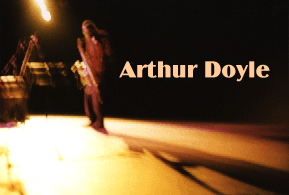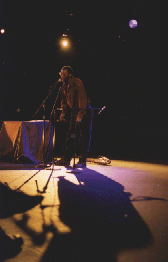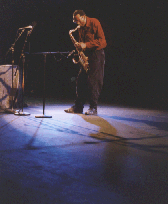

Well, what can I say about Arthur Doyle. This man has one of the most unique expressive voices in jazz. We caught up with Doyle after a wondeful performance at Diverse Works where he co-headlined with Joe McPhee for an amazing evening. Arthur Doyle, surrounded by darkness and highlighted by the stage lights, resembled some alien deep sea fish singing and skronking as we sat in the safety of a bathysphere.
The fact that McPhee and Doyle came from such polar opposite directions only heightened each performer's strenghts. McPhee coming from a very scholarly approach played a very nuanced and sublte set whereas Doyle played with a force that I can only descibe as Punk Rock.
The following interview, is trascribed from a taped interview and I have tried to keep it pretty much as intact as possible but I have for the sake of clarity taken away some of his speaking quirks which by the way I believe explain a lot about how he plays because the thought patterns are very similar. Still this is pretty much as it was...
WG: What do you consider to be music and what does it communicate to the audience?
AD: Music to me the universal language, the universal way of communicating. When I play in front of an audience I try to communicate all the things that happen to me in this life , the life before that, and the life after that.

WG: You tend to alternate between singing, playing the sax, and playing the recorder. What is the difference between the lyrics and the instruments in terms of what they are communicating.
AD: Is no different really. All am communicating the same thing. Things that I can't do off my saxophone I can do with my voice and things that I can't [do with] the saxophone I can do [with] spoken words with singing lyrics. My flute, you know, my recorder that's an extension of what I can't get on the tenor saxophone in terms of the upper registers of my instrument. But it's all one really.
I have so much I want to say that I can't express it all on one instrument per se. Like when I play my tenor saxophone...I sing and play at the same time but I got to the point where there were things I wanted to say with the spoken word that I couldn't do on the tenor saxophone so, I figured out a way to start singing and I always wanted to sing so I started to sing and the lyrics express what Life is to me...experiences in life like sort of abstract.

Like I may say "fat cat in the applejack hat" That's my father. He used to wear a applejack hat. Like "Gooray." I can't say "Gooray" so I say "Goorey" with my voice. I want to pay homage to a lot of people that I can't do on the saxophone but I can do with spoken words....but I try to put it all [together] where all combine to be one. You can't seperate the singing from the saxophone, you can't separate the flute from the saxophone, you can't separate none of it from the saxophone.
It all revolves around one instrument and that is Me, Myself.
WG: For example if there is a speaker he is trying to convince the audience of something. Music to me seems a bit more generous than that....unlike say a politician or salesman that is trying to sell something a musician is just trying to express themselves. How does the audience fit into it when you speak to them though music?

AD: Well, like you said a politician is trying to sell...I'm trying to sell too. [I'm trying to sell] my experience in life, their experience, I'm trying to touch them to bring out the emotional side of them so they can respond to the music. In turn I'm projecting the emotion side of myself to them to bring out the emotion side of them trying to sell to them things that have happened to me that may happen to them, things that will happen to me that may happen to them, things that may not never happen to me that may not never happen to them, but it's possible that things like that may happen.
I'm trying to sell to but I'm trying to communicate. You can tell when you're communicating with an audience and when you're not communicating with an audience. The biggest thing is the emotion because everybody feels emotion even if you don't understand (the language)like when I was in Japan...I sung songs there but just communicating emotions....it's the universal language and you don't need to know the words or nothing like that. It's a feeling.
WG: In an abstract sense what makes a musician a good musician?
AD: Being able to communicate with yourself and with an audience of people. Even if they don't understand or know the music, no matter how far out or abstract it may be, being able to communicate is the biggest thing.
WG: When I was standing in line to the restroom after your performance I had a debate with a fellow who was convinced that your music was about being as obnoxious and see how far it was possible to push your audience. He said you were an atonal challenge to the audience. Where as to me your music is very happy music. So what about people who you don't communicate with or is his take not totally wrong?

AD:(laughs) Some of it's right. I try to lift people from the worldly things, lift them to a more of an abstract way of communicating. Like if you can get past the words...I don't have much, you know, but I'm a happy man as long as I'm able to create and be around people and communicate. I'm happy and I try to lift people above the worldly aspect of life.
WG: This may be an unfair question and it may not even be valid but when the lights came up there were probably generously 5% of the crowd was African-American. My question is how does this make you feel....or is this not indicative of your typical audience?
AD: It is.
WG: Well, how does that make you feel to see that kind of ethnic breakup of an audience....or is that an unfair question?

AD: It's a fair question.....I was one night about twelve or one o'clock in New York City. I was listening to the radio station and Jimi Hendryx came on and he said "Wow man, I wish more black people would come hear me play." That's the same way I feel, because exclusive for about three or four years, I played in Harlem and [unintelligible] we got a fantastic response but, uh, black people are funny you know .....[unintelligable].... [but] I don't know what the makeup is of this particular area and what type of publicity was done [or whether] Black people could hear it or not. If I was playing in a predominantly Black people area then maybe more Blacks would come out maybe..maybe not. But it hurt me, you know, I'd like to see more blacks there.
Ozy Lady Dozy Lady (excerpt) |
Olca Cola in Angola (excerpt) |
The above samples are in Real Audio format so if ya ain't got it may we suggest you visit their site at
 http://www.real.com/products/player/
and grab the freebie version. Good news is that they have improved the product quite a bit and this sounds damn good finally. The bad news is (because we are not streaming) it will take between 4-5 min. on a 28.8 modem to download. Still, if you've never heard Arthur Doyle it's worth the wait.
http://www.real.com/products/player/
and grab the freebie version. Good news is that they have improved the product quite a bit and this sounds damn good finally. The bad news is (because we are not streaming) it will take between 4-5 min. on a 28.8 modem to download. Still, if you've never heard Arthur Doyle it's worth the wait.
Back der Worship Guitars Homepage
Send threatening mail to us here at:
rmedina@worshipguitars.org